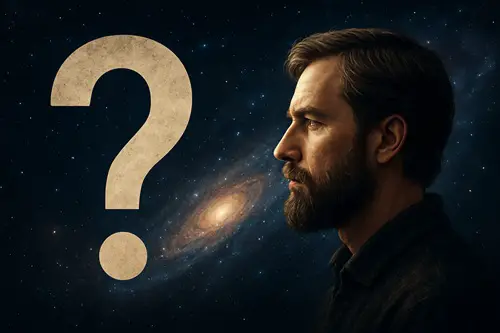|
TRANSLATE THIS ARTICLE
Integral World: Exploring Theories of Everything
An independent forum for a critical discussion of the integral philosophy of Ken Wilber
  Frank Visser, graduated as a psychologist of culture and religion, founded IntegralWorld in 1997. He worked as production manager for various publishing houses and as service manager for various internet companies and lives in Amsterdam. Books: Ken Wilber: Thought as Passion (SUNY, 2003), and The Corona Conspiracy: Combatting Disinformation about the Coronavirus (Kindle, 2020). Frank Visser, graduated as a psychologist of culture and religion, founded IntegralWorld in 1997. He worked as production manager for various publishing houses and as service manager for various internet companies and lives in Amsterdam. Books: Ken Wilber: Thought as Passion (SUNY, 2003), and The Corona Conspiracy: Combatting Disinformation about the Coronavirus (Kindle, 2020).
Check out my other conversations with ChatGPT What Was There Before There Was Anything?And Why Invoking Information Doesn't Save GodFrank Visser / ChatGPT
 Theists often try to turn the tables on skeptics. When asked the classic question—“Who created God?”—they reply with another: “Well, what was there before there was anything?” It's a question designed to sound profound, to make disbelief seem as naïve as belief. But behind its rhetorical force lies confusion. It mistakes mystery for argument, and awe for explanation. The suggestion, popular among modern apologists like Stephen Meyer, is that only an intelligent mind could account for the apparent information in life and the cosmos. Yet both moves—the question and the hypothesis—fail for the same reason: they assume that what we don't yet understand must have been consciously designed. The result is a comforting story, not a coherent explanation. 1. A False Analogy: God vs. RealityWhen an atheist asks “Who created God?”, they are probing a metaphysical claim: that an intelligent, timeless being caused the universe. When a theist replies “What was there before there was anything?”, they are shifting the discussion from logic to poetry. The two questions are not symmetrical. Science explores how matter and energy behave; it doesn't posit conscious agents to explain them. Theology introduces a supernatural personality as cause. Confusing the two domains is like treating cosmology as biography. 2. Infinite Regress and the Exemption of GodIf everything needs a cause, then God too must have one. If something can exist without a cause, then the universe—or the physical laws that govern it—might fit that bill. The theist tries to have it both ways: the universe can't be eternal, but God can. That's special pleading, not reasoning. Once we admit that something must simply be, the simpler choice is the one we already know exists: the natural world. It makes no sense to multiply mysteries by adding a cosmic mind beyond space and time. 3. The Big Bang and the End of “Before”Asking “What was there before there was anything?” assumes that time existed before the universe. But cosmology tells us that time, space, and matter began together. The Big Bang didn't happen in time—it created time. Asking what was “before” it is like asking what's north of the North Pole. There may be deeper realities beyond our universe—quantum vacua, multiverses, or timeless physical states—but none requires an intelligence to get started. The universe doesn't need divine permission to exist. 4. Stephen Meyer's “Information” ArgumentIn The Return of the God Hypothesis, Stephen Meyer argues that the universe and life display information, and that our “uniform experience” shows information always comes from minds. Therefore, God must be the ultimate mind behind the cosmos.[1] It sounds convincing until we realize that the analogy between human codes and natural patterns is superficial. DNA isn't a message written by someone; it's a molecular structure that evolved. Complexity can arise through natural processes. Information is not injected into matter by thought—it emerges from it. 5. Why “Information Implies Mind” Is WrongInformation is not a ghostly signal floating above matter; it is a measure of structure, order, or correlation within physical systems. Crystals, snowflakes, and galaxies all display information-rich organization, yet no one imagines they were designed by intelligence. Evolution, too, is an information-generating process—blind, gradual, and cumulative. Over time, natural selection preserves successful patterns and discards failures. That's how minds arise, not how they create. To leap from “there is information” to “therefore there is a divine mind” is to commit the same old fallacy of design in modern dress. 6. The Emotional Need Behind the ArgumentThe appeal of such reasoning is psychological as much as intellectual. It restores meaning to a cold universe. If an intelligence created everything, then our lives have cosmic significance. If not, we are products of impersonal processes. The choice feels existential, even moral. But emotional need is not evidence. The feeling of purpose does not guarantee a purposer. To confuse the two is to substitute comfort for clarity. 7. The Simpler AlternativeWhen asked, “What was there before there was anything?”, the honest scientific answer is: we don't yet know. But “we don't know” is not a gap to be filled with God. Ignorance is not evidence of divinity. History shows the pattern: every mystery once attributed to God—lightning, disease, planetary motion—has yielded to natural understanding. The origin of existence itself may one day do the same. 8. Conclusion: The Universe Doesn't Need a CreatorThe question “What was there before there was anything?” pretends to be profound, but it collapses under scrutiny. It confuses categories, violates logic, and appeals to mystery instead of reason. Adding Stephen Meyer's “information” argument doesn't repair it—it only decorates the same old gap with scientific-sounding words. If something must be eternal, let it be reality itself, not an invisible mind that mirrors our own. The universe may be strange, but it doesn't need to think in order to exist. In the end, nothing—in the sense of no mind, no purpose, no plan—may be the true beginning of everything. NOTES[1] Frank Visser, "The Return of the God Hypothesis, A Skeptical Review of Stephen Meyer's latest book", www.integralworld.net, November 2023.
Comment Form is loading comments...
|